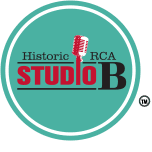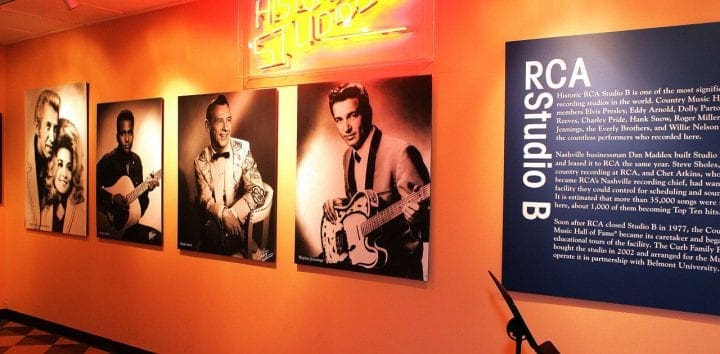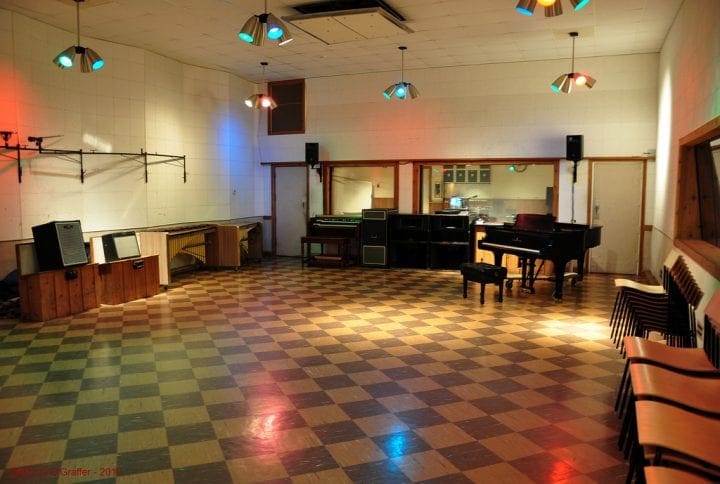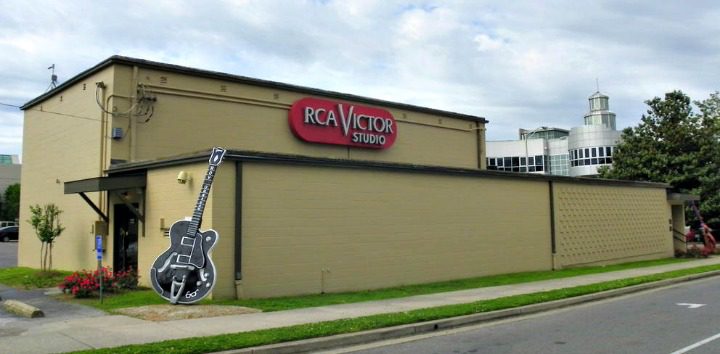Built in 1957, RCA Studio B is known as the “Home of 1,000 Hits.” Dan Maddox constructed the studio at the request of Chet Atkins and Steve Sholes to assist RCA Victor and other record labels in Nashville. Legend holds that recording manager and RCA chief engineer Bill Miltenberg drew the plans for the historic studio on the back of a napkin. Two years later, the studio mixed “The Three Bells,” a number one hit by The Browns. We hope that you love our visit to RCA Studio B in Nashville Tennessee.

The studio would go on to produce 40 million-selling singles and over 200 individual recordings by Elvis Presley. When a new larger recording facility was constructed on 17th Avenue in 1964, it was designated as Studio A, and the original was renamed RCA Studio B.
 In 1959, Sound Engineer Bill Porter felt the studio’s original acoustics created an uneven frequency response. Spending $60 from petty cash, he purchased fiberglass acoustic tiles, cut them into triangles and hung them from the ceiling at various heights. They were nicknamed “Porter Pyramids.” The engineer also placed marks on the floor where he wanted the various performers to stand.
In 1959, Sound Engineer Bill Porter felt the studio’s original acoustics created an uneven frequency response. Spending $60 from petty cash, he purchased fiberglass acoustic tiles, cut them into triangles and hung them from the ceiling at various heights. They were nicknamed “Porter Pyramids.” The engineer also placed marks on the floor where he wanted the various performers to stand.
The process of overcoming the acoustical problems inside the studio created a sophisticated musical style that became known as the Nashville Sound. Popular in the 1960s, it was characterized by its background vocals and string accompaniments. The style helped to rejuvenate the country music industry and made Nashville Tennessee a hub for the recording industry.
 Of the more than 35,000 songs recorded inside the studio, over 1,000 went on to become certified hits. These include Elvis Presley’s “Are You Lonesome Tonight.”, “I Will Always Love You” by Dolly Parton and “Kiss an Angel Good Morning” by Charlie Pride. Other well-known artists who recorded here include Willie Nelson, Roy Orbison and The Everly Brothers as well as Wynonna, Martina McBride and Carrie Underwood.
Of the more than 35,000 songs recorded inside the studio, over 1,000 went on to become certified hits. These include Elvis Presley’s “Are You Lonesome Tonight.”, “I Will Always Love You” by Dolly Parton and “Kiss an Angel Good Morning” by Charlie Pride. Other well-known artists who recorded here include Willie Nelson, Roy Orbison and The Everly Brothers as well as Wynonna, Martina McBride and Carrie Underwood.

This well-known Nashville Tennessee landmark is the birthplace of numerous recording innovations including a unique musical shorthand system. The system enables musicians to quickly note a song’s particular chord structure and then create individual parts that still maintain the overall integrity of the piece. Located at 222 5th Avenue South,
RCA Studio B was added to the National Register of Historic Places in 2012.
 RCA Studio B in Nashville, Tennessee
RCA Studio B in Nashville, Tennessee
 In 1959, Sound Engineer Bill Porter felt the studio’s original acoustics created an uneven frequency response. Spending $60 from petty cash, he purchased fiberglass acoustic tiles, cut them into triangles and hung them from the ceiling at various heights. They were nicknamed “Porter Pyramids.” The engineer also placed marks on the floor where he wanted the various performers to stand.
In 1959, Sound Engineer Bill Porter felt the studio’s original acoustics created an uneven frequency response. Spending $60 from petty cash, he purchased fiberglass acoustic tiles, cut them into triangles and hung them from the ceiling at various heights. They were nicknamed “Porter Pyramids.” The engineer also placed marks on the floor where he wanted the various performers to stand. Of the more than 35,000 songs recorded inside the studio, over 1,000 went on to become certified hits. These include Elvis Presley’s “Are You Lonesome Tonight.”, “I Will Always Love You” by Dolly Parton and “Kiss an Angel Good Morning” by Charlie Pride. Other well-known artists who recorded here include Willie Nelson, Roy Orbison and The Everly Brothers as well as Wynonna, Martina McBride and Carrie Underwood.
Of the more than 35,000 songs recorded inside the studio, over 1,000 went on to become certified hits. These include Elvis Presley’s “Are You Lonesome Tonight.”, “I Will Always Love You” by Dolly Parton and “Kiss an Angel Good Morning” by Charlie Pride. Other well-known artists who recorded here include Willie Nelson, Roy Orbison and The Everly Brothers as well as Wynonna, Martina McBride and Carrie Underwood. This well-known Nashville Tennessee landmark is the birthplace of numerous recording innovations including a unique musical shorthand system. The system enables musicians to quickly note a song’s particular chord structure and then create individual parts that still maintain the overall integrity of the piece. Located at 222 5th Avenue South,
This well-known Nashville Tennessee landmark is the birthplace of numerous recording innovations including a unique musical shorthand system. The system enables musicians to quickly note a song’s particular chord structure and then create individual parts that still maintain the overall integrity of the piece. Located at 222 5th Avenue South,  The studio was donated to the Country Music Hall of Fame in 1992. Guided tours sponsored by the hall offer a glimpse into the history of the recording industry during one of Music City’s most exciting and classic periods. The studio is also used as a classroom by local area high school and college students studying sound recording. Make certain to plan your visit to
The studio was donated to the Country Music Hall of Fame in 1992. Guided tours sponsored by the hall offer a glimpse into the history of the recording industry during one of Music City’s most exciting and classic periods. The studio is also used as a classroom by local area high school and college students studying sound recording. Make certain to plan your visit to  We were hosted on the
We were hosted on the 




That looks like so much fun! I’ve always loved Nashville and all the music that just oozes out of the city.
It looks so beautiful in there! I love the history of the building as well. It’s so interesting!
Oh my goodness, what fun! I have always seen studios on TV and in movies and have wondered if they really are soooooo cool! LOL. This is just awesome. Thanks for sharing with us
There’s so much history here. I would love to take a tour if I’m ever in Nashville.
It’s great that students get to use this historical place to study sound recording. So many great artists have performed here.
I love anything that’s Disney-themed or Disney related. Love the fact that you can learn so much in here… definitely something I’d make a trip for!
No lie, this looks exactly like my uncle’s basement (I know , sounds funny) but really… he absolutely loves the era and music and designed his finished basement in this fashion. Looks like so much fun!
Wow! I bet that place is awesome!!! What a cool thing to do. 🙂
Nashville is such a fun place to visit. There is no shortage of music there! Looks like everyone had a great time!
I was not familiar with this place before reading your post. I enjoyed reading the behind the scenes full story of things that you shared.
That is SOOO cool! I would love to be a part of our nation’s musical history. You can’t skip Nashville! I would love to see more of the Adventures by Disney destinations.
That’s so cool that! recording studios are really neat, I’d love to go see one sometime.
Pingback: Best Attractions in Memphis Tennessee Divine Lifestyle